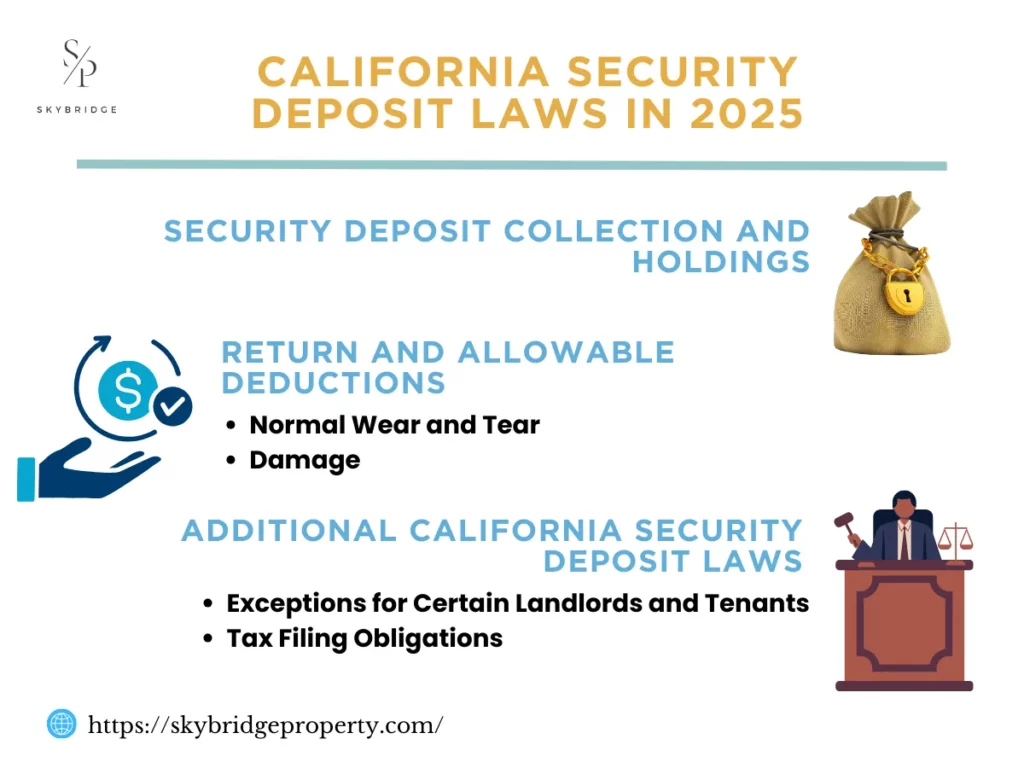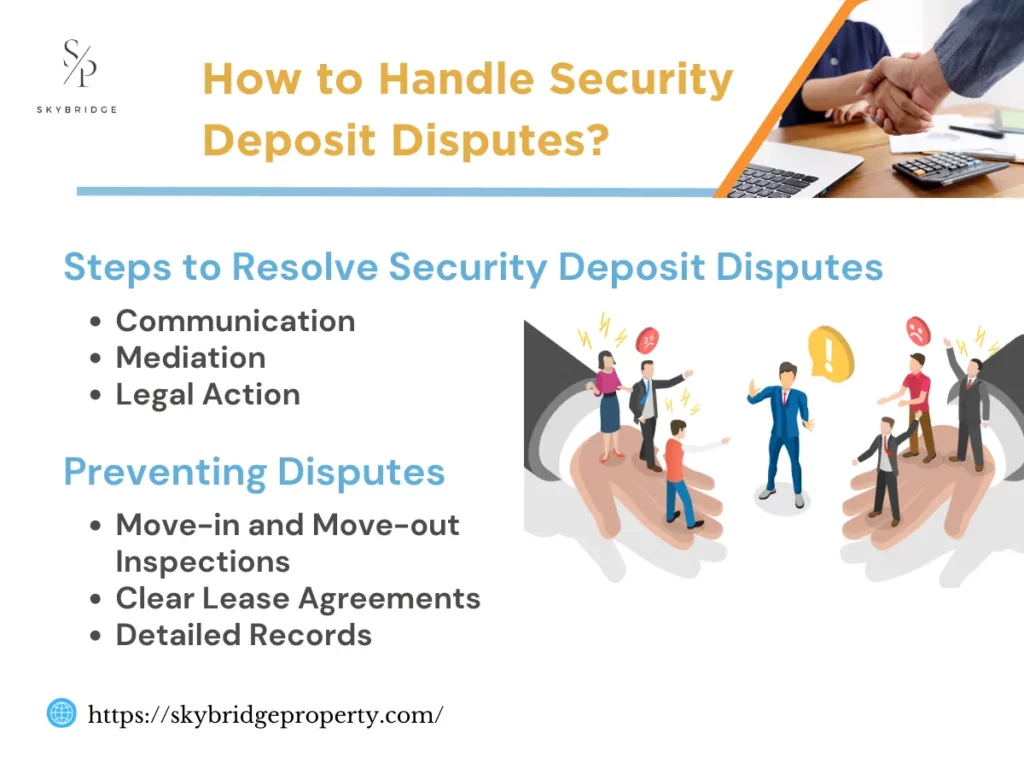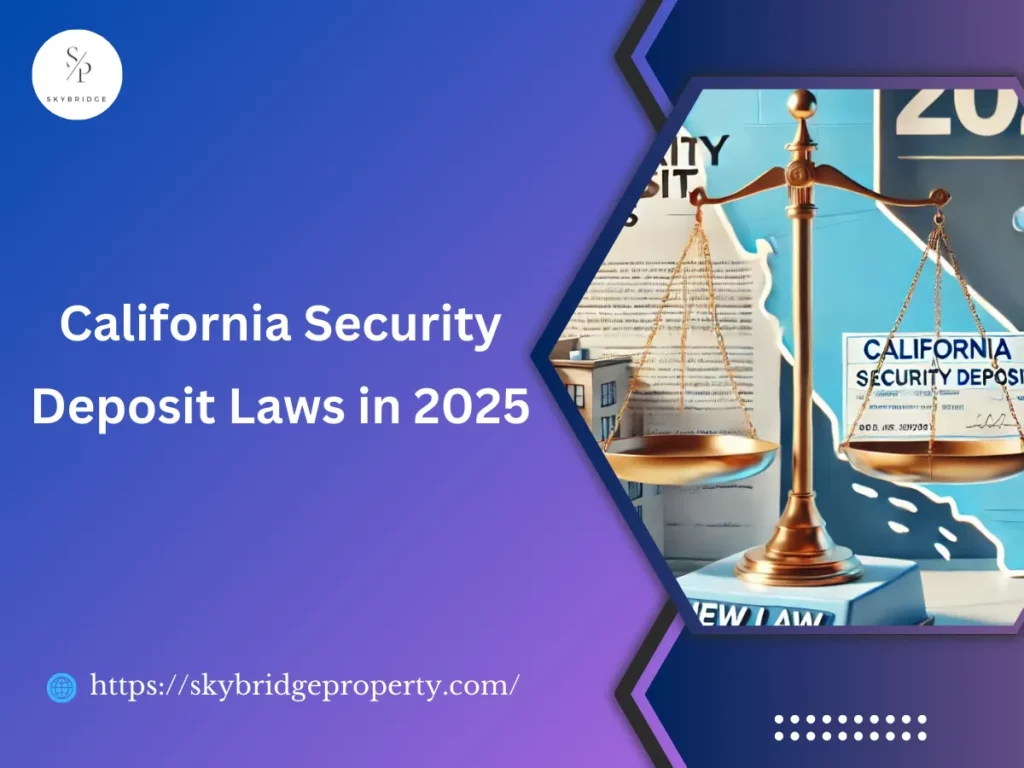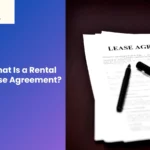California Security Deposit Laws, regulated by CA Civ. Code §1950.5 outlines the rules for collecting, holding, and returning security deposits for rental properties. Significant changes to these laws were introduced through Assembly Bill 12 (AB 12), which was passed in 2023. The new rules came into effect on July 1, 2024. From this date forward, landlords are limited to charging no more than one month’s rent as a security deposit, whether the rental unit is furnished or unfurnished. This change is designed to prevent tenants from facing excessive upfront costs and create a more balanced rental environment.
In addition to the new limits on deposit amounts, landlords will be required to return the security deposit to tenants within 21 days of vacating the property. However, small landlords, defined as those who own no more than two residential properties with four or fewer units, are still allowed to charge up to two months’ rent for a security deposit. These updates to California’s security deposit laws ensure fairness and transparency, benefiting tenants and landlords throughout the state.

Security Deposit Collection and Holdings
In California, landlords collect security deposits upfront as part of the California landlord tenant laws and mutual agreement. The deposit protects the landlord against potential damages, unpaid rent, or cleaning costs when the tenant vacates the rental property. Landlords must clearly state the deposit amount and its purpose in the lease agreement before the tenant moves in. According to California Civil Code §1950.5, the security deposit must be paid before the tenant takes possession of the rental unit.
The maximum security deposit amount is determined by the type of rental unit and the landlord’s property holdings. Until July 1, 2024, landlords may charge up to two times the monthly rent for unfurnished units and three times the monthly rent for furnished units. However, under Assembly Bill 12 (AB 12), effective July 1, 2024, this limit changes to one month’s rent for furnished and unfurnished units. A special exemption applies to landlords who own no more than two residential properties totalling four or fewer rental units. These landlords may charge up to two months’ rent if they meet specific criteria, such as being a natural person or an LLC owned by natural persons.
Once collected, security deposits must be properly handled to comply with California law. Landlords must keep the deposit in a separate account and cannot mix it with personal or business funds. While California law generally does not mandate interest payments on deposits, cities like Los Angeles and Berkeley may require it. At the end of the tenancy, landlords must return the deposit within 21 days, along with an itemized statement of any deductions, ensuring transparency and adherence to legal standards.
Return and Allowable Deductions
Under California Civil Code §1950.5, landlords must return the tenant’s security deposit within 21 days of the tenant’s departure. If deductions are made, landlords must provide an itemized statement outlining each expense, receipt, or invoice. This ensures that deductions are justified and transparent. Failure to meet the 21-day deadline can result in legal consequences, including penalties or forfeiture of the deposit.
Allowable deductions are limited to specific expenses. These include unpaid rent, the cost of repairing tenant-caused damage and cleaning fees to restore the unit to its original condition. Repairs may only address damages exceeding normal wear and tear, and any deductions must be assessed fairly and accurately. Landlords can also deduct the cost of replacing or restoring personal property, such as furniture, but only if explicitly permitted by the lease agreement. Security deposits cannot be used for pre-existing damages or excessive, unnecessary costs.
Landlords are legally required to maintain proper documentation when making deductions. This includes itemized lists of damages, copies of repair invoices, and receipts for services performed. This documentation provides accountability and reduces the risk of disputes, ensuring compliance with California’s security deposit laws.
Normal Wear and Tear
Normal wear and tear refers to the natural deterioration of a rental property due to everyday use. Examples include faded carpets, minor wall scuff marks, and worn-out appliances. These conditions occur regardless of tenant care and cannot be deducted from the security deposit. California law distinguishes these signs of ordinary wear from damage requiring repair.
Damage
Damage that exceeds normal wear and tear can be deducted from the security deposit. Common examples include broken windows, large carpet stains, and wall holes. Landlords must assess damage fairly and calculate repair costs based on market rates. Exaggerated or unnecessary expenses are prohibited, and tenants can dispute unfair deductions through legal or mediation channels.
Additional California Security Deposit Laws
California law provides exceptions and unique conditions for specific tenancy arrangements and property types. These laws accommodate different rental scenarios while ensuring landlords and tenants understand their rights and responsibilities.
Exceptions for Certain Landlords and Tenants
Special rules apply to tenants with disabilities or those with unique tenancy arrangements. Landlords must provide reasonable accommodations for disabled tenants, including potential waivers of specific fees or deposits if required under fair housing laws. However, landlords may still collect a security deposit within allowable limits, ensuring compliance with state and federal regulations.
Landlords can charge a security deposit for tenants under Section 8 housing assistance, though the deposit must adhere to state-regulated caps. For leases lasting six months or longer, landlords may request an advance payment of up to six months’ rent. This exception helps secure longer-term leases when both parties agree to such terms. Landlords can also charge additional fees for improvements to the rental unit, but only if both the tenant and landlord agree to the changes and document them in the lease.
These rules apply exclusively to residential properties. Mobile home spaces are limited to a one-month rent deposit, while commercial properties have no security deposit limits, allowing flexibility in business lease negotiations.
Tax Filing Obligations
The treatment of security deposits for tax purposes in California depends on how the deposit is used. If the full deposit is refunded to the tenant at the end of the lease, it is not considered taxable income for the landlord. However, suppose a landlord retains part or all of the deposit for unpaid rent, damages, or other allowable expenses (such as cleaning costs). In that case, the retained amount must be reported as taxable income.
According to IRS regulations, landlords must report retained amounts as income in the year the deductions are made. If the total amount retained exceeds $600, the landlord must issue the tenant an IRS Form 1099-MISC by January 31 of the following tax year. This ensures that both the landlord and tenant comply with federal tax requirements.
Tenants may face tax implications if certain rental expenses, such as damages paid or other deductions, qualify as tax-deductible. To substantiate their tax filings, both parties must maintain thorough documentation, including itemized statements and receipts. Consulting a tax professional can help landlords and tenants navigate the specific tax rules associated with security deposits and ensure full compliance with state and federal tax laws.
Local Security Deposit Laws in Los Angeles
While California security deposit laws apply uniformly across the state, certain cities, including Los Angeles, have additional rules that provide enhanced tenant protections. One key difference is the requirement to pay interest on security deposits. Under California state law, landlords are not required to pay interest on deposits. However, cities such as Los Angeles, Berkeley, Capitola, Santa Cruz County, West Hollywood, and San Francisco have local ordinances mandating interest payments.
Interests in Security Deposit
In Los Angeles, landlords are required to pay annual interest on security deposits if a tenant has occupied the rental unit for at least one year. These local rules ensure tenants benefit from holding large deposits while renting long-term properties. Failure to comply can result in penalties and other legal consequences under Los Angeles city regulations.
Requirements for Paying Interest
- Landlords must pay interest annually or upon the return of the security deposit.
- The Los Angeles Housing Department (LAHD) sets the applicable interest rate subject to annual adjustments.
- From January 1, 2025, to December 31, 2025, the required interest rate is 4.32%.
Calculation and Documentation
- The interest is calculated based on the total security deposit held by the landlord during the tenancy.
- Landlords must provide a detailed statement showing the interest calculation and payment.
- Proper documentation of interest payments helps landlords comply with city laws and reduces the risk of disputes.
How to Handle Security Deposit Disputes?

Disputes over security deposits are a common conflict between landlords and tenants. These disputes arise when tenants disagree with landlords’ deductions or fail to return the deposit within the legally required 21-day timeframe. Other common causes include disputes over what constitutes normal wear and tear versus damage, improper itemization of deductions, or inadequate documentation to support repair or cleaning costs.
Steps to Resolve Security Deposit Disputes
- Communication: The first step is to have an open discussion. Tenants should request clarification about deductions, and landlords should provide an itemized list with supporting receipts or invoices.
- Mediation: If communication fails, both parties can seek mediation through local housing authorities or tenant-landlord mediation programs. This neutral approach often resolves disputes without going to court.
- Legal Action: As a last resort, disputes can be handled in small claims court. Tenants can sue for the return of their deposit, and landlords can defend their deductions by presenting documentation as evidence.
Preventing Disputes
To reduce conflicts, landlords and tenants should take the following precautions:
- Move-in and Move-out Inspections: Conduct thorough inspections and document the property’s condition with photos or video.
- Clear Lease Agreements: Ensure the lease specifies the allowable uses of the security deposit and any local regulations.
- Detailed Records: Landlords should maintain records of deductions, repair costs, and communications with the tenant.
Effective documentation and clear communication can prevent misunderstandings and streamline the dispute-resolution process.
How SkyBridge Property Group helps property owners with California Security Deposit Law?
Skybridge Property Group offers reliable support to property owners in ensuring full compliance with California Security Deposit Laws. We understand the complexities of California property management regulations and provide property owners with the legal guidance they need to manage security deposits effectively. From helping you understand the maximum deposit limits based on rental types to assisting with proper deduction documentation, we ensure your practices align with state and local laws, including the latest updates like Assembly Bill 12 (AB 12) and city-specific requirements like those in Los Angeles. Our property management services in Los Angeles include providing legal advice tailored to your specific rental needs, deposit management to ensure compliance with holding and returning deposits, and documentation support to maintain clear records. Whether preparing itemized lists, conducting move-in/move-out inspections, or providing timely interest payments on deposits, Skybridge Property Group makes the process seamless and straightforward. Property owners can avoid costly mistakes and legal pitfalls while maintaining positive tenant relationships and safeguarding their investments with our assistance. Choose Skybridge Property Group for peace of mind and expert handling of security deposit matters.







